Is it possible for a breastfed baby to have milk?
Supplementing a newborn with goat's or cow's milk or completely switching to it if there is not enough breast milk is a long-standing tradition. After all, this is also a natural product intended for feeding babies. However, most pediatricians condemn this custom. And there are reasons for this.
The product produced by farm animals contains many useful substances:
- amino acids;
- polysaccharides;
- water-soluble and fat-soluble vitamins;
- minerals: calcium, phosphorus, copper, zinc, magnesium, potassium.
And all these compounds are present in milk in a bioavailable form, perfectly absorbed by the bodies of newborn calves. But cow's milk, like goat's milk, is not intended for children due to high doses of active compounds. Regular inclusion of it in the diet of infants contributes to the development of health-threatening conditions.
- It contains several times more casein - a protein for the digestion of which there are no enzymes in the children's gastrointestinal tract.
- Huge doses of phosphorus and sodium provoke increased kidney function and the excretion of necessary calcium.
- Lack of iron and folic acid increases the risk of developing anemic conditions and jeopardizes the formation of the nervous system.
- The fat content of animal milk is much higher than that of mother's milk. This adversely affects the condition of the liver.
We must not forget about the baby’s possible allergy to the components of such a product.
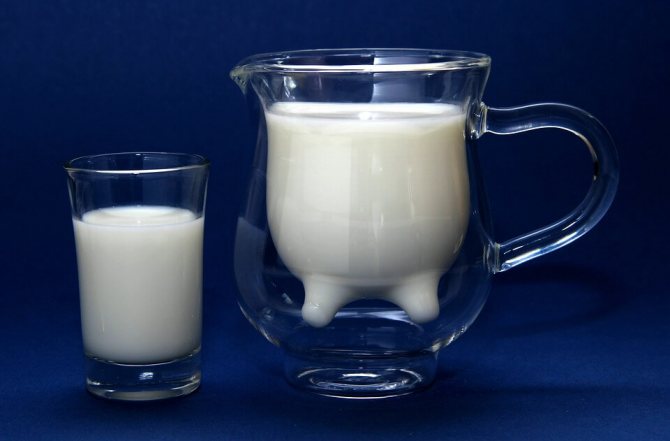
When can you start giving your baby milk?
In accordance with the data provided by medicine today, pure goat and cow's milk is highly not recommended for giving to a child under 1 year of age. Many important factors are cited to support this approach.
- The product contains a huge amount of minerals that create discomfort for such a weak and unadapted body. First of all, this is dangerous because the kidneys are heavily overloaded while processing the complex component.
- The composition of animal milk is noticeably different from its female counterpart. In particular, it has very high levels of protein and sodium. When these indicators go off scale, the risk of developing such an unpleasant condition as allergies increases.
- The product contains too much casein and a minimum of carbohydrates. The level of iodine, zinc, vitamins E and C is too low for the normal development of the child's body.
- For proper brain function, a child needs fatty acids; cow's milk contains too few of them.
- A low level of iron in the product can provoke the development of iron deficiency anemia in a newborn, since there will not be the necessary basis for the active reproduction of red blood cells.
- Giving milk to a breastfeeding baby (especially younger than 6 months) every day can cause gastrointestinal bleeding.
- Amino acids such as cystine and taurine, and folic acid take part in the development of the baby. Milk does not contain these substances at all, which will definitely have a negative impact on the child.
Useful: Preparing cauliflower puree for babies
Families with a history of insulin-dependent diabetes should be especially careful when introducing cow's milk into a baby's diet. Early consumption of the product can lead to diabetes in the future.
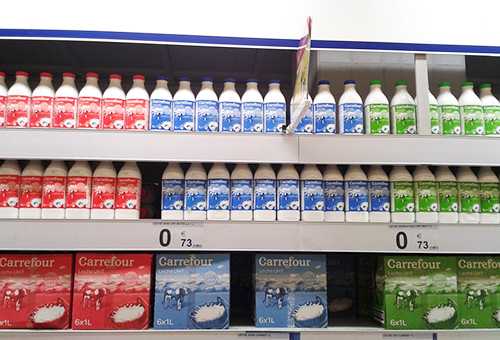
At what age can a child be given milk?
Babies can be introduced to animal milk once they reach 1 year of age. And if there is a deficiency or absence of maternal milk, supplement it with formula.
With age, the child’s body will mature for the introduction of animal products into the menu, and it will be easier for the enzymatic system to digest milk proteins and sugars.
A few words about the different types of product. Disputes on the questions: can children have cow's milk, can a child have goat's milk, and nutritionists and pediatricians consider it pointless. It all depends on the individual preferences and reaction of the child. The composition of nutrients in one form and in the other is the same. And the differences are minor:
- goat contains more casein, less vitamin D and iron, its fat content is 50% higher;
- There is several times less folic acid in goat milk, and more organic acids.
What kind of milk should I give to children? Trying to pour only goat's or cow's milk into a child, relying on its great benefits, is unreasonable. It is recommended to let your child independently evaluate the taste of both types of products.
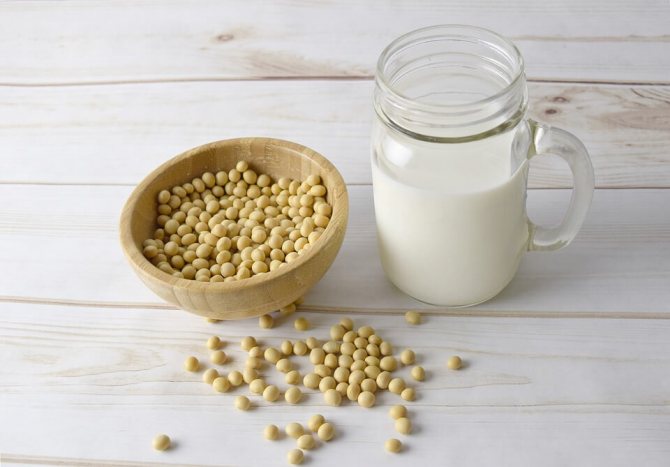
At what age can you give cow's milk?
For the final and most clear answer to the question: “At what age can a child be given cow’s milk?” I suggest turning to one of the most authoritative sources: WHO.
The World Health Organization guidelines regarding feeding and nutrition of infants and children under one year of age, designed specifically for the European region and the former Soviet republics, establish the following rules:
- Before the age of one year, in almost all countries it is recommended to exclude cow's milk from the child's menu.
- Up to one year, specialized infant formula is ALWAYS healthier and preferable to whole cow's milk
- If, for economic reasons, constant formula feeding is not possible, in agreement with the pediatrician, milk can be introduced into the child’s diet from nine months.

Milk and dairy products in small doses are allowed for use in preparing complementary feeding dishes from six months.
Cow's milk can also be gradually introduced into the diet as a drink from nine to twelve months - if breast milk is not enough or to wean off infant formula.
Another authority in the field of pediatrics and everything related to children, Dr. Komarovsky, to the question “At what age can a child be given boiled cow’s milk?”, answers unequivocally: not earlier than the child turns one year old.
From one to three years of age, milk consumption should be limited to two glasses a day, but after three years, the child can drink any amount as desired.
How to give milk correctly
The rules for including a drink in the diet are the same as for other types of complementary foods:
- in the first days it is enough to give 2-3 tbsp. l;
- You should not immediately mix milk with other products - it is a rather heavy product, you need to get used to it;
- The fat content of the product should not be higher than 3%; more nutritious ingredients should be diluted with boiled water.
Optimal drink temperature: +25–30°C. Only raw food should be boiled before use. Store-bought ultra-pasteurized does not require processing.
If your child likes milk, you should gradually increase the volume to 150 ml 2-3 times a week. It is recommended to cook milk porridges: oatmeal, rice, combined with cookies or wheat bread. By two years, the portion may double.
At what age can children drink coffee?
Experts do not recommend giving coffee with milk (cappuccino) to young children. An unformed body is not ready for harmful coffee components, so negative reactions may occur.
Dr. Komarovsky does not recommend giving a child coffee until he or she is 5 years old, when the immune system is still poorly developed. At the age of 12, the aromatic drink is also contraindicated; during this period, the development of the reproductive system begins and hormonal changes occur. Teenagers can drink the drink from the age of 14-15, when the body is strong enough. But you need to know that children’s brain and heart muscle are still developing, so the dosage of the drink must be controlled.
The opinion of doctors regarding the age at which children can drink coffee with milk comes down to the following - from 7 years old. The optimal daily caffeine intake is up to 50 mg. To prepare the drink, add about 20 ml of coffee to a glass of milk. It is allowed to be offered to children aged 7 to 10 years - once a month, from 11 to 14 years - once a week. Moreover, on the day of drinking coffee, caffeine-containing products should be excluded from the children's menu.
Contraindications:
- heart and vascular diseases;
- diabetes;
- cerebral palsy;
- pathologies of the central nervous system;
- increased excitability or fatigue;
- problems with the functioning of the gastrointestinal tract.
Interesting! Which countries rank first in coffee consumption?
Parents should explain to their child how a high-quality product differs from a low-quality one, and tell them about the dangers of drinking from a vending machine. However, you can offer dark chocolate as an alternative.

Contraindications
You should stop trying to feed milk and milk-based foods:
- in case of an allergic reaction: skin itching, atopic dermatitis, rash;
- abdominal colic, nausea, flatulence, belching, stool disorders;
- diagnosed lactase and other enzymatic deficiency.
If your baby independently refuses milk, you can compensate for the beneficial substances and nutrients by increasing the portions of eggs, cottage cheese, meat, fish, vegetables and other dishes that you like. It is important to remember that fermented milk products are digested and tolerated better than whole milk.
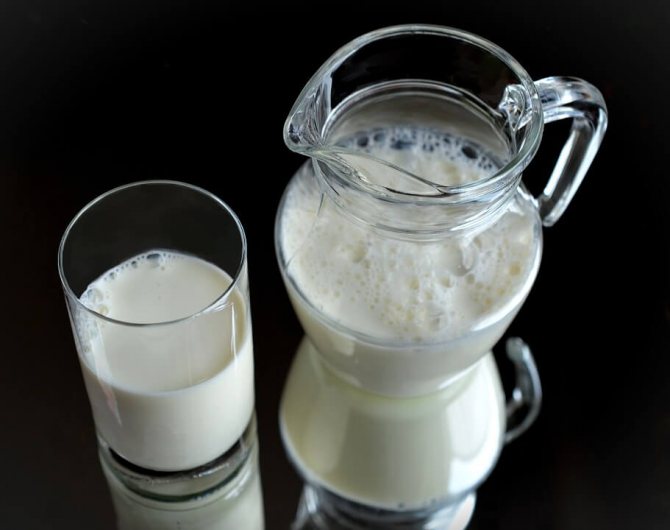
What types of milk can be given to a small child?
Many parents are concerned not only about when a child can be given milk, but also about what types of product are considered optimal for the child’s body. Given the variety of modern products, deciding on this is indeed not always easy.
- First you need to decide on the fat content of the drink. Many mothers prefer to give their baby skim milk (with minimal fat content). This is the most wrong approach - the baby does not receive the necessary nutrients and is not able to develop normally. The ideal option is whole food, which has a fat level of about 3-4%. You can also purchase pasteurized milk, which is as fresh as possible, with a short shelf life.
- Goat milk occupies a special place in the group of dairy products. The drink has a high nutritional value, a significant amount of vitamins and minerals. It significantly strengthens the immune system and is used as a means of recovery from illness. Experts say that goat milk should be used as an additional product when feeding children. According to parents, the drink is less likely than its cow counterpart to cause allergies in children. Parents should pay attention to the label when they buy goat milk - it should indicate the content of folic acid. If it is absent, you will have to diversify the child’s diet with fish, meat, legumes and cereals.
- Lactose product. A healthy drink that can be purchased ready-made or prepared yourself. An enzyme is simply added to a regular drink, which facilitates the process of absorption of the product by the intestines.
- Yogurt. A wonderful milk replacement. It is best to give it to a child from one year old. The product saturates the intestines with beneficial bacteria that stimulate the digestion process. At the same time, the risk of developing allergies is minimal. Yogurt can be consumed even by children who are allergic to goat's or cow's milk. The product can be used both in its pure form and as a base for preparing baby sauces, puddings and creams.
- There are sweet surrogates for dairy products on the market, which are made from a plant base. They are not suitable for young children, they can be given to a child as a dessert when he is at least 7-8 years old.
Helpful: What to do if your child eats a lot of sweets? Restrict or allow?
You cannot completely give up dairy products. After a year, milk is mandatory in children's diets, as it is a source of calcium and vitamin D, which are necessary to strengthen bones, teeth, hair and nails.
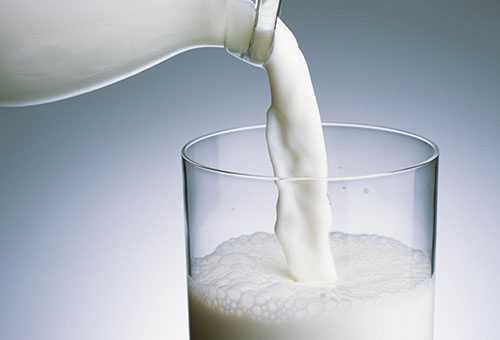
When can a baby be given milk?
Modern pediatricians say that in the first months of a child’s life it is strictly contraindicated to give him cow’s milk. Breastfeeding experts say that a baby can be given milk, but only mother's milk and until he starts eating solid food.
However, there are the latest studies that show that if cow's milk is included in the baby's menu in the first 15 days of life, then in the future this will protect babies from various dangerous allergies.
Professor Itzhak Katz, who works in Israel at the University of Tel Aviv in the Department of Pediatrics, claims that those children who consume cow's milk protein are protected from developing an allergy to this protein for life. Such newborns are not allergic to this product in adulthood.
But this study was conducted only among those children who took not ordinary cow’s milk, but a special formula for newborns, since ordinary cow’s milk protein can be quite dangerous for children, it leads to rashes, breathing problems, sometimes even shock and, subsequently, death. That is, this type of complementary feeding is regarded by experts as a twofold state of affairs, just like vaccinations.
This study shows that if a baby is not given cow's milk during the first 15 days of life, then it should not be introduced into the diet until one year after birth. What to do before this age? It is recommended to give children special dairy products adapted to the child's body - this is acidophilus milk or children's kefir, as well as special milk for children. These products are produced by dairy kitchens and are designed for each age group separately.
Why can't you give cow's milk until you are one year old?
- Cow's milk contains a large amount of minerals - calcium, sodium, phosphorus, chlorine, magnesium, potassium. All of them create noticeable discomfort for the child’s body, especially since the baby’s urinary system is not yet fully developed. As a result, the child’s kidneys are overloaded by 20-30% when they are excreting cow’s milk.
- This product contains much more sodium and protein than breast milk. Moreover, this protein has a completely different composition - womb and causes various allergic reactions, therefore cow's milk can provoke an allergy to all dairy products in a child.
- It contains a lot of casein.
- Contains few carbohydrates.
- There is a low content of elements necessary for the child, such as iodine, zinc, copper, vitamins E and C.
- Cow's milk is low in fatty acids, which are essential for brain development.
- It is low in iron, which is the main component for the child’s multiplying red blood cells; as a result, the baby may develop iron deficiency anemia.
- Children who drink cow's milk daily may experience gastrointestinal bleeding, especially before the age of six months.
- This milk does not contain amino acids such as taurine and cystine, as well as folic acid - this is very important for the development of the baby.
- Early introduction of cow's milk into the diet often leads to type 1 diabetes mellitus, which is why if there are insulin-dependent patients in the family, it is still better to refuse it as complementary food for children under one year of age.











